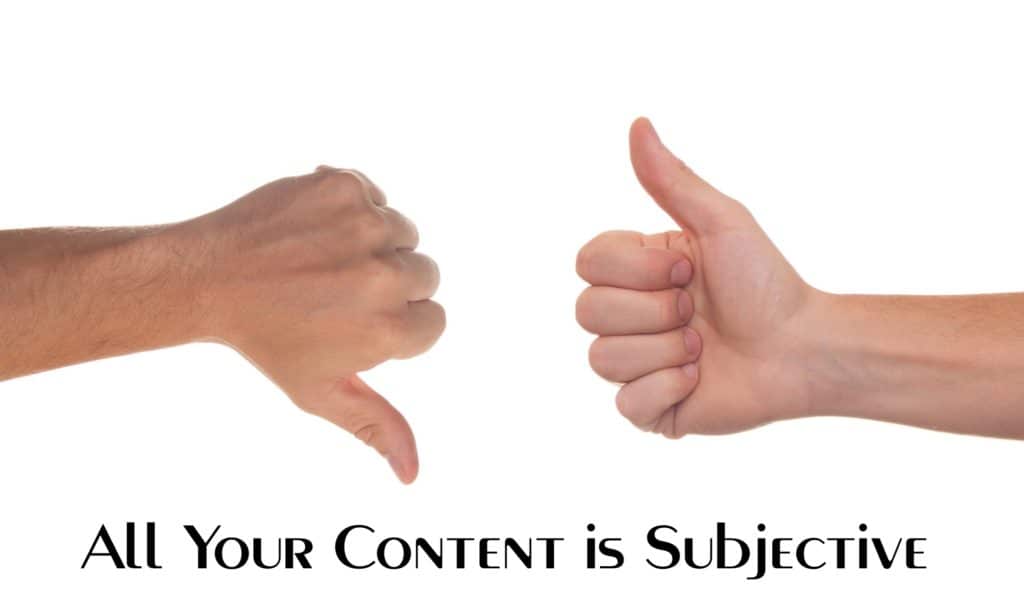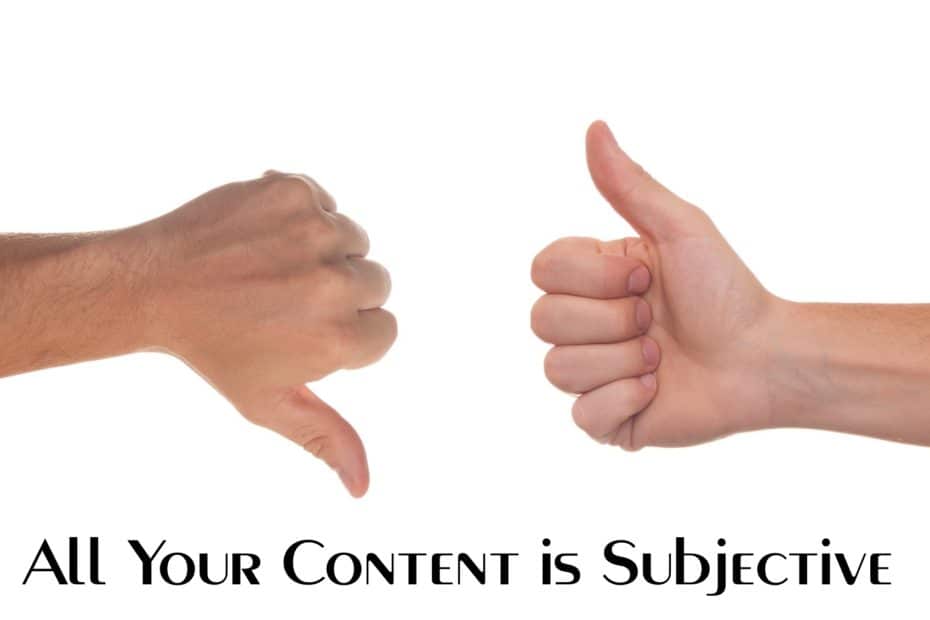
Have you ever gone to see that movie that everybody raved about only to feel that you were duped?
For me, it was Spiderman 2 which would go on to be an enormous hit. I had seen early footage and wasn’t impressed but it was all the rage so purchased a ticket and headed to the theater.
My friends thought it was great but I didn’t like it. That’s not exactly true. I HATED it.
It’s been 18 years and I couldn’t tell you anymore why I had such an adverse reaction to this movie but it’s a reminder that content is subjective.
Subjectivity can be a tricky issue but you can use it to your advantage.
There are three ideas I’m going to talk about in this article:
- A definition of what subjectivity is and what it looks like
- How experiences impact subjectivity
- How to address subjectivity as you create content for your marketing
Ready? Let’s go.
What is Subjectivity?
Subjectivity is “the influence of personal beliefs or feelings, rather than facts.”
Every day you experience the world and make determinations on whether something is good, bad, or somewhere in between.
It’s even the things that are mundane.
You may go to the grocery store and decide that the prices you see are expensive. While it feels like a fact to you it’s subjective because it is based on your situation.
Somebody who makes $1 million a year may agree with you prices have gone up but don’t feel that prices are expensive.
It could be a decision that somebody else has made.
As a Denver Broncos fan, I was flabbergasted when our coach decided to run the clock down at the end of a game and attempt a game-winning 64-yard field goal. The kicker missed the field goal and they lost the game.
While the consensus seemed to be that it was an awful decision I did see fans on social media who thought it was the right decision even though the kick was missed and the team lost.
It could be something that somebody has written.
A few years ago I read a blog post that was heralded as a blow-your-mind type of article that would change the way those who read it thought about this particular topic.
I read it and it and I didn’t like it. Yet in the comments, people overwhelmingly loved it.
I was so taken aback that I decided that maybe I should read it again at a later date. It was always possible I was in a weird mood.
I came back a few days later and re-read the article. Twice. Did I change my mind? No.
You probably have similar stories. Articles you’ve read. Movies or television shows you watched. Artists you’ve heard.
Everybody seems to love it (or hate it) and you sit there and think, “Really?”
Experience Informs Your Beliefs
Experiences matter. They impact what you believe and this will, in turn, inform how you view the world.
When I was younger I was a drummer. There were times I bought an album simply because there was a good drummer playing on it.
One of the drummers I was into at the time was Lars Ulrich from Metallica. This is back when And Justice For All came out (you know, back in the stone age).
Lars’ drum parts were fantastic. I had a friend, also a drummer, who thought Lars was the most amazing drummer ever.
One day he comes up to me and he’s upset. Really upset.
Somebody, who didn’t play drums, didn’t share my friend’s opinion.
In fact, he told my friend that Lars wasn’t very good and the best drummer ever was Rikki Rockett from Poison.
To us, saying Rikki Rockett was a better drummer than Lars Ulrich was kind of like saying that a Kia is a better car than a Ferrari. This opinion was not only uninformed, but it was also ludicrous.
About six to seven years after this moment, I met Rikki Rockett and I have to say, he’s a hell of a nice guy. Looking back, he isn’t a bad drummer. He plays pretty basic but that’s fine. It works well for what Poison does.
He wouldn’t have fit into Metallica but to be fair, Lars would have been awful in Poison.
The person who is the right fit for one situation may be a poor fit for another. That’s another post.
Our experience as drummers informed us about who we felt was better. The kid who believed Rikki Rockett was the best didn’t have our experience or any knowledge about what skills were needed to be a drummer.
Does that mean his opinion was right or wrong? To us, it was wrong. To many others, it might have been right.
Not everybody has the same experiences which means aren’t looking at things through the same lens.
Even if they are, it doesn’t mean that they will have the same opinion.
Maybe you put together a marketing plan and it ended in disaster and so you no longer believe in creating a plan. I would disagree and argue planning wasn’t the issue but the plan itself or its execution.
Experiences inform how you view the world and how you feel about it.
Addressing Subjectivity as You Create Your Content
I’ve seen people lament about all the mediocre content that is on the internet but what’s mediocre to them may not be mediocre to somebody else.
What’s the definition of mediocre? How does somebody’s experience influence what they think is good and mediocre? Great and garbage?
One of the best but most unhelpful pieces of advice I and many others have given is: Write great content.
Not very helpful, right?
That’s pretty vague. What constitutes great? It depends.
Do you see the trap?
Not everybody does.
You’re creating content: blog posts, a podcast, video, and posts on social media. How do you deal with this in a constructive way?
Here are some things to think about.
Focus on the audience you are trying to reach.
What are the issues they are having?
What kind of help are they looking for?
What are their experiences?
Now think. What are you trying to accomplish and how can you use this information to create something that resonates with them?
In the end, it is about them.
You might think that piece of content is amazing but if you’re reading this blog, you’re likely not creating content to satisfy an artistic itch. You’re doing it to help market your business and your audience gets the final say on whether it works or not.
If it doesn’t resonate with your target audience, it won’t help your marketing.
Now, this isn’t bulletproof. Nothing is. This is just a guide.
The idea isn’t that all of the people who see your content will think it’s amazing or 100% agree with your viewpoint.
If this is what you’re hoping to do, you’re living in a dream world. This is never going to happen.
What you want to do is create content that swings subjectivity in your favor but it starts with understanding your audience.
Tip the tide in your favor and stop speaking at your audience and start speaking with them. Learn about them and then you can start creating content that gets the results you need.
- Is Your Marketing Connected? - March 6, 2025
- Stop Planning and Start Strategizing - October 24, 2024
- The Importance of Creating a Connection With Your Marketing - June 6, 2024

